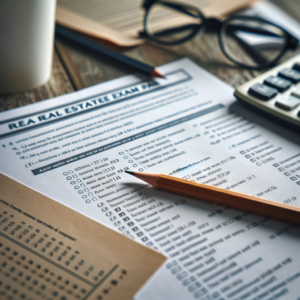How hard is the real estate exam? (+ how to pass it?)
Embarking on a career in real estate? This guide addresses a crucial step in your journey: the real estate exam. Known for its rigorous standards, this exam tests your knowledge and readiness for the real estate industry.
Our article breaks down the exam’s difficulty level, offering practical tips and strategies not only to pass but also to excel.
Whether you’re a seasoned professional seeking a refresher or a novice entering the field, this comprehensive guide will equip you with the insights and tools needed for success.
Understanding the Real Estate Exam: An Overview
The real estate exam is a multiple-choice test that covers a variety of topics related to the practice of real estate. The topics covered on the exam include real estate law, ethics, math, and general real estate knowledge.
The exam is designed to test your knowledge of these topics and to see if you’re ready to be a licensed real estate agent.
On test day, you’ll be given a couple of hours to complete the exam. The exam is divided into two sections, and you’ll need to pass both sections in order to pass the exam.
The first section of the exam is the national portion, which covers topics that are relevant to all states. The second section is the state-specific portion, which covers topics that are specific to your state.
The national portion of the exam is made up of 80 multiple-choice questions, and you’ll have 1 hour and 45 minutes to complete this section. The state-specific portion of the exam is made up of 40 multiple-choice questions, and you’ll have 45 minutes to complete this section.
So, what does it take to pass the real estate exam? The passing score for the exam varies from state to state, but it’s generally around 70% or higher.
This means that you’ll need to answer at least 56 out of 80 questions correctly on the national portion of the exam and at least 28 out of 40 questions correctly on the state-specific portion of the exam.
Comprehensive Guide to Pre-Licensing Courses
Pre-licensing courses are your roadmap to success. They don’t just prepare you for the exam but lay the foundation of your real estate knowledge.
One important factor to consider is the cost of the course. Pre-licensing courses can range in price from a few hundred dollars to several thousand dollars. You will also want to look at the format of the course. Some courses are offered in a traditional classroom setting, while others are offered online.
Another factor to consider is the length of the course. Some courses are only a few weeks, while others are several months. Consider your schedule and choose a course that will fit into your life.
Once you have considered all of these factors, you will be able to narrow down your choices and find the pre-licensing course that is right for you.
Maximizing Benefits from Practice Exams
Practice exams are a crucial tool in your exam preparation arsenal.
They serve as a reality check, showing where you stand and what areas need more focus. But more than that, they acclimate you to the format and timing of the real exam, reducing anxiety and boosting confidence.
Regular practice can transform the unknown into the familiar, making the exam less daunting.
Vary your practice exams. Don’t just stick to one type or source.
Different exams offer different perspectives, covering a wider array of topics and question styles. This varied practice ensures a comprehensive understanding and readiness for any curveballs the actual exam might throw at you.
Remember, practice exams are not just about testing knowledge but building it.
Effective Test-Taking Strategies for Success
Developing the right strategies can be the difference between passing and excelling. Learn how to approach each question, manage time, and avoid stress.
Here are five strategies for success on your real estate exam:
1. Read the question carefully.
This may seem like a no-brainer, but it’s important to take the time to read each question thoroughly. Often, the answers are buried in the question itself. Don’t just skim–read and re-read until you’re confident you understand what’s being asked.
2. Manage your time wisely.
Time management is critical for exams. Be sure to budget your time so that you can answer all the questions. It’s often helpful to start with the easier questions and save the more difficult ones for later.
This way, you can return to them with fresh eyes if you have time.
3. Don’t stress.
It’s natural to feel some nervousness before an exam but try not to let it turn into stress.
Stress can lead to careless mistakes. Take a few deep breaths and relax. Remind yourself that you’ve prepared as best as you can.
4. Trust your instincts.
If you’re unsure of an answer, go with your first instinct. More often than not, it’s the right one.
5. Take practice exams.
A great way to prepare for your real estate exam is to take practice exams.
This will help you get used to the format of the exam and the types of questions you’ll be asked. It’s also a good way to identify any areas you must focus on before exam day.
With these strategies in mind, you’ll be well on your way to success on your real estate exam.
The Importance of Note-Taking in Exam Preparation
Note-taking isn’t just about keeping records; it’s about making the information your own. Discover techniques to make your notes a powerful study ally.
This process solidifies your understanding and creates a valuable resource for review. Good notes serve as a roadmap, guiding you through your revision and helping you recall information during the exam quickly.
Moreover, the act of writing itself reinforces memory, making it easier to retrieve information when needed.
Developing a systematic approach to note-taking, whether through outlining, mind mapping, or the Cornell method, can significantly enhance the effectiveness of your study sessions and, ultimately, your performance on the exam.
Self-Care Tips During Exam Prep
Self-care during exam preparation is crucial, as it directly impacts your mental and physical well-being, which in turn affects your ability to study effectively.
Firstly, maintain a balanced diet rich in nutrients that fuel the brain, like omega-3 fatty acids, and avoid excessive caffeine or sugar.
Secondly, establish a regular sleep pattern, as adequate rest is essential for memory consolidation and cognitive function.
Exercise is also key; even light physical activity, like a daily walk, can reduce stress and boost mood and focus. Additionally, allocate time for relaxation and hobbies to prevent burnout.
Mindfulness practices such as meditation or yoga can be particularly beneficial in managing stress and maintaining focus.
Pacing Yourself: It’s a Marathon, Not a Sprint
Preparing for the real estate exam is a journey that demands endurance. It’s about consistent, steady effort rather than a last-minute cram. Setting a realistic study schedule that spans weeks or months, depending on your prior knowledge and learning speed, is key.
This approach not only aids in thorough understanding but also prevents the overwhelming stress of trying to learn everything at once.
Maintaining a Positive Mindset Throughout the Preparation
A positive mindset can be your strongest ally. Cultivating a can-do attitude, focusing on progress rather than perfection, and viewing challenges as learning opportunities will keep your spirits high.
Surround yourself with positivity, whether it’s through motivational podcasts, study groups, or affirmations. Remember, your attitude often determines your altitude!
Navigating Post-Exam Procedures: Next Steps
Once the exam is over, it’s time to focus on what comes next.
Familiarize yourself with the licensing process, which can vary by state.
This might include submitting fingerprints, completing a background check, and selecting a broker to work with. Start planning early to ensure a smooth transition from passing the exam to starting your career.
Cost Breakdown: Real Estate Exam Fees
Understanding the financial aspect of taking the exam is crucial. Break down the costs, including application fees, exam fees, and any additional expenses such as study materials or prep courses. This transparency helps candidates budget accordingly and avoid unexpected expenses.
This cost breakdown will help you understand the different fees associated with taking the real estate exam so that you can budget accordingly.
The first fee you will encounter is the application fee. This fee is paid to the exam provider and is generally around $100. The second fee is the exam fee. This fee is also paid to the exam provider and is usually around $200. In addition to these two fees, you will also need to purchase study materials and/or take a prep course.
The cost of study materials varies depending on where you purchase them and how comprehensive you want them to be. A good estimate for the cost of study materials is $100-$200. The cost of a prep course can range from a couple hundred to a couple thousand dollars.
So, the total cost of taking the real estate exam can range from $400-$2400. This is a significant amount of money, and you should be prepared to budget accordingly.
There are several ways to save money on the cost of taking the real estate exam. One way is to purchase used study materials. Another way is to take an online prep course instead of an in-person prep course.
There are also a number of scholarships and grants available to help offset the cost of taking the real estate exam. Do your research and take advantage of any opportunities that are available to you.
The real estate exam is a significant financial investment. But, if you are prepared and budget accordingly, you can minimize the impact on your finances.
The Role of Real Estate Exam Prep Courses
Real estate exam prep courses provide you with the opportunity to practice taking the exam under timed conditions. You can also get feedback on your performance so that you can identify any areas where you need to brush up on your knowledge.
In addition, real estate exam prep courses can help you build your confidence. Taking practice exams can help you feel more prepared and less anxious on exam day.
If you’re wondering whether you should take a real estate exam prep course, our advice is to go for it. It can make a big difference in how you perform on the exam.
Common Pitfalls and How to Avoid Them
You should be aware of some of the common pitfalls that can trip up new real estate agents. By avoiding these pitfalls, you’ll be well on your way to a successful career in real estate.
One of the most common pitfalls is failing to get enough experience. Real estate is a people business, and the more experience you have working with buyers and sellers, the better you’ll be at it.
You should also get experience working with different types of properties in different price ranges. This will give you the confidence and skills you need to handle any situation that comes up.
Another common pitfall is failing to stay up to date on the latest trends in the real estate market.
This is a rapidly changing industry, and what worked last year may not work this year. Keep up with the latest news and information so you can always be ahead of the curve.
Another mistake new agents make is not having a solid marketing plan.
You need to stand out from the crowd and attract buyers and sellers to your business. Develop a marketing plan that includes both online and offline marketing tactics. And make sure you are consistent with your marketing efforts.
Finally, don’t try to do everything yourself. Real estate is a complex business, and there are a lot of moving parts. Don’t be afraid to delegate tasks to other members of your team or outsource certain tasks to professionals.
This will free up your time so you can focus on what you do best.
Your Next Steps After Passing the Real Estate Exam
After you’ve successfully passed the real estate exam, you’ll need to take a few more steps in order to start working as a real estate agent. Depending on your state, you may need to apply for a real estate license and complete a short course on real estate principles.
In most states, you’ll need to be at least 18 years old and have a high school diploma or equivalent in order to be eligible for a real estate license. You’ll also need to complete a set number of hours of approved real estate education.
Once you’ve completed all the requirements, you can apply for your license by submitting the appropriate paperwork and fee to your state’s real estate commission.
Once you’ve been licensed, you’ll need to find a broker to work under. A broker is a licensed real estate agent who has met additional education and experience requirements. Brokers can work independently, or they can operate a real estate firm.
Once you’ve found a broker to work with, you’ll need to complete any additional training they require, and then you’ll be ready to start working as a real estate agent!
So, is getting your real estate license hard? It can vary depending on your state’s requirements and how much time you’re able to dedicate to studying. Still, if you’re willing to put in the work, you can definitely obtain your license and start working in this exciting industry.
Exploring Career Opportunities in Real Estate Post-Exam
You’ve finally done it. You’ve studied hard, gone through all the necessary real estate education requirements, and you’ve passed your state’s real estate exam. Congratulations! This is a huge accomplishment and the first major step in starting your career in real estate. So, what’s next?
Just because you’ve passed the exam doesn’t mean you’re fully licensed and ready to start working right away. In most states, you’ll need to complete a few additional steps before you can officially practice as a real estate agent. Here’s a quick overview of what you can expect after passing your real estate exam.
1. Complete a Background Check
In order to obtain your license, most states will require you to go through a criminal background check. In some cases, you may also be required to submit a financial background check.
This is to ensure that you’re qualified to enter the real estate industry and that you don’t have any past criminal history that could potentially jeopardize your career.
2. Find a Real Estate Broker
In order to start working as a real estate agent, you’ll need to find a broker to work under. A broker is a licensed individual who has the experience and knowledge necessary to help you succeed in the industry.
They can provide you with guidance, support, and even leads on prospective clients. It’s important to take your time when choosing a broker, as they will play a big role in helping you launch your career.
3. Complete any Required Training
Depending on your state, you may be required to complete additional training before you’re fully licensed and able to start working. In some cases, this training can be completed online, but in other cases, you may need to attend classes in person.
Be sure to check with your state’s licensing board to find out what’s required in your specific case.
4. Get Started Working!
Once you’ve completed all of the necessary steps, it’s time to start working!
Get out there and start networking, marketing yourself, and, most importantly, helping your clients buy or sell homes. If you put in the hard work, success in the real estate industry is sure to follow.
Finally, provides an overview of the diverse career paths available in real estate. From residential sales to commercial real estate, property management, or becoming a broker, the possibilities are vast. Inspire readers to explore and find their niche in the expansive world of real estate.
Diving into the Real Estate Exam: Your Burning Questions Answered!
Is the Real Estate Exam a Tough Nut to Crack?
Picture this: a test that’s a mix of Monopoly and Law & Order! The real estate exam can be quite the brain teaser, packed with everything from property laws to real estate jargon. It’s like a fitness test for your brain, where your prep level and your state’s own unique exam flavor really set the tone.
Any Secret Sauce for Acing the Exam?
Imagine gearing up for a real estate adventure! The key to success? Dive into a solid prep course like it’s your favorite novel, carve out quality study time like it’s your treasure, and tackle practice exams like they’re puzzles. This trio is your map to the treasure chest of success!
How Do I Gear Up for This Exam Adventure?
It’s like prepping for a big hike! Know your trail (state requirements), pack your gear (complete a real estate course), and don’t forget your compass (study guides and practice exams). Remember, it’s a marathon, not a sprint, so lace up your boots and prepare for an educational hike!
What’s the Score with Passing Rates?
Think of it as a weather forecast for exam day. Pass rates are as varied as climates across states! They swing depending on how tricky the exam is, how well-prepared hikers (test-takers) are, and the quality of their gear (prep programs). A sneak peek at your state’s stats is like checking the weather app – it gives you a clue about what to expect.
Why Do Some Aspiring Agents Miss the Mark?
Sometimes, even the best climbers stumble. It could be a slip in prep, underestimating the mountain of info, or simply running out of time to train. The trick is to spot those slippery spots – your weak areas – and train harder in those domains. Think of it as focusing your workout for that final climb.








